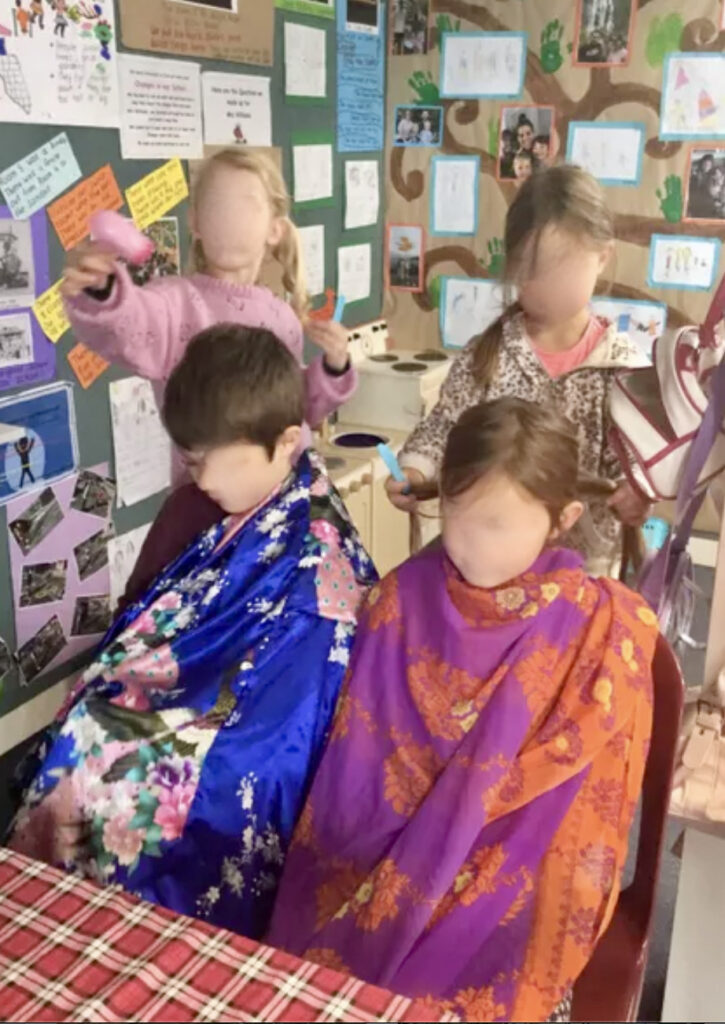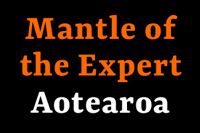HNS inquiry into supporting and assessing dramatic play

Yr 1 children at HNS play ‘hairdressers’
Over the last three years I’ve had the privilege of working closely with Hillcrest Normal School in Kirikiriroa Hamilton. The whole staff has explored Dramatic Inquiry in its various forms and the school now has DI embedded into its local curriculum. Our work together resulted in a number of awesome outcomes one of which I’d like to share in this post.
Guided by their team leader, Trace May, members of the junior team undertook a collective inquiry into dramatic play in their NE and year 1 classrooms, beginning with a definition of assessment as “celebrating that which is most of value”. The inquiry included trialling a number of different tools for observing children’s play, including Broadhead’s Social Play Continuum.
With the permission of the school, I’m sharing the report that was shared with the School’s Board of Trustees. I think it’ll be of particular interest to colleagues investigating play as part of the Dramatic Inquiry spectrum.
The report identifies various next steps for this team and I’m sure they would agree that another important focus for future inquiry is how to ensure assessments are culturally sustaining within the bicultural context of Aotearoa New Zealand. The mahi continues!
Collaborative inquiry into supporting and assessing dramatic play 2021
Yr 1 team & Dr Viv Aitken
The Year One team has been providing a Learning through Play environment for the last four years. Our goal in Learning through Play is to help develop the social and emotional skills of children as this then aids them in coping in other learning areas as well. Observations of children have been part of the teaching and planning during this time. In 2021, the team was asked to be a part of a collaborative inquiry to explore Learning through Play (with a particular focus on dramatic play). Two key guiding questions for the inquiry were: What can I as a teacher do and say to support children’s learning during the play? How can we assess / celebrate children’s learning in meaningful ways?
Through PLD with Dr Viv Aitken we learned about the Broadhead Social Play continuum that travels from the Associative Domain (where a child will watch and not engage in play with others), through the Social Domain (where a child starts to interact with others), to the Highly Social Domain and the Co-operative Domain (where children co-create play together). We also learned about theories of play and the importance of dramatic play for literacy and academic and social development.
During the inquiry the team trialled new planning techniques to introduce dramatic play into other areas of play. We also used a range of new teaching techniques and conducted trials of different observation formats including Broadhead’s Social continuum (P. Broadhead, 2003). Teachers were supported with ongoing PLD support, one meeting per term for reflective conversations and sharing back and with weekly 1:1 coaching sessions.
We trialled the Social Play continuum assessment tool with target children identified as having difficulties joining with other children to play. One child from each of the 5 classes was chosen for focussed observation. There was a mix of two girls and three boys with a range of ethnicities from Maaori, European, African, and Indian. The ages of the children were between 5 and half and 6.
Data was generated on these children’s progress using the social play continuum. Case studies were then produced, which provided evidence of progress over time. An example of a case study can be found at this link. As well as providing individualised assessment information, the case studies were collated to give a sense of how this group has progressed over the year. Here is a summary:
- Children accepted the teacher’s offers.
- Target children were assessed as being mainly in the Associative Domain at the start of the year.
- All children had traits of being on the outside of social play at the beginning of the year.
- All children were often non-verbal within play and seemed to lack the communication skills to interact with their peers.
- All were better at verbally interacting with their teacher by the end of the year.
- Significant teacher support was required to help these children become more confident in their interactions
- 4 out of the 5 children were able to consolidate their skills within the Social Domain.
- One child started to make progress and wanted to join his peers but due to his aggressive behaviour the other children would not let him join.
Other data for the wider inquiry included photographs of all children’s play, teacher notes of professional conversations during PLD sessions and team meetings, and learning Snapshots shared on padlet (online collaborative scrapbook).
As well as providing new assessment data for target children, the inquiry resulted in many rich themes and findings. There is insufficient space to go into full detail here (a slide show is being prepared to share at a professional conference). Benefits for children included high engagement, increased skills in interacting and improvising with their peers, and improved oral language. Benefits for teachers included new learnings for their teaching and new ways of approaching assessment.
Our recommendations include
- Continue written observations using Broadhead’s social continuum and other observation methods
- Continue case studies approach for focussed tracking of target children
- Keep going with padlet ‘snapshots’ for sharing with colleagues
- Explore ways of reporting progress to parents, children, and other teachers (written reports? Sharing padlets? Case studies?)
- Maintain the regular coaching sessions for staff
- Continue to set aside time during team meetings for reflections, professional readings
- Ensure ongoing professional learning for this group – and induction of new team members
Afterword (from Viv A): The year 1 team under the leadership of Trace May, showed great commitment to this inquiry – continuing to give their time and energy even with the extraordinary challenges of this year and its various Covid disruptions. I commend them on their professionalism, energy, insight and effort as teachers. I truly think the results of this ako are cutting edge and the new tools and approaches developed will be of great interest to others in the field. I would definitely encourage them to present this work at regional and national professional conferences etc. Kia Ora.
It was such a rich experience working with Hillcrest Normal School on this inquiry and our wider Professional Learning – funded by Ministry of Education. Big thanks to Trace, the NE and year 1 teachers, to Gay Gilbert (recently retired dynamic DP) Marie (Principal) and everyone else involved.

Leave a Reply
Want to join the discussion?Feel free to contribute!